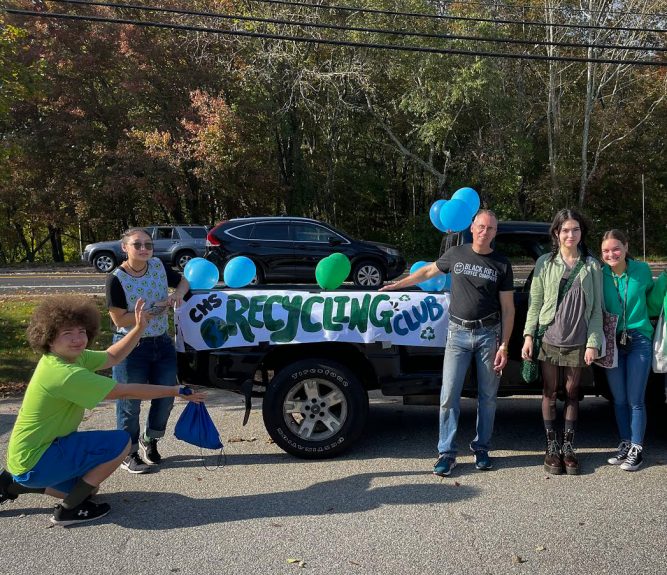“Seeing how much trash is placed in the recycling bins will inspire you to educate yourself and others about what they can do to make an impact in the school. It is important that we all learn how essential recycling is and how it’s important to do it the right way.”

The recycling club is an integral part of managing waste at Coventry High, yet some students are unaware of its existence, never mind its importance. Here is some insightful input from the recycling club members, including myself:
“Seeing how much trash is placed in the recycling bins will inspire you to educate yourself and others about what they can do to make an impact in the school. It is important that we all learn how essential recycling is and how it’s important to do it the right way.” -Kerry Medeiros
“Really having people understand what we can and cannot recycle is something that the people in CHS need to learn and respect so our community can make a difference in our town, and hopefully share it on to the rest of our community and maybe not only get more kids involved in Recycling Club, but maybe even get adults to open their eyes to it more”- Peter Fontaine
“The service hours are fantastic, and it really is surprising that a ‘janitorial’ club can be a social club too.” -Billie Desjarlais
“Use reusable water bottles as opposed to plastic ones once. If you do use plastic, it has tons of applications around your house to be repurposed. Think before you blindly throw away/recycle things!” -Ryan Connelly
Although it isn’t our responsibility to teach you what is and isn’t recyclable, here is a simple outline. Examples of great recycling materials found in the school bins are paper, cardboard, empty plastic bottles, empty soda cans, empty cartons, and plastic containers labeled as recyclable. The kinds of objects that are not recyclable, yet are found in the school bins weekly, include but are not limited to food, chip bags, and snack wrappers, tissues, paper towels, soiled paper, bagged items, soft plastics (like bags), gum, styrofoam, rubber gloves, medical masks, full water bottles, and full coffee cups. Not only do we have to sort these items out of the recycling bins, but we also have to watch the contents of the entire bins get thrown out. This is because these non-recyclable objects like food actually soil the recyclable items in the bin. By putting these non-recyclables in the recycling bin, you are also creating a lot of waste. Many people do not realize what a singular, full coffee cup can do to a recycling bin of perfectly recyclable paper. Others are doing the right thing, making the choice to recycle, and the act of a few people can spoil the entire recycling bin. The recycling club members and I could not tell you how many times we have been forced to throw out soiled recyclables, as it happens far too often.
When collecting the recycling bins, we also catch sight of the trash bins in classrooms filled with recyclables. As members of the recycling club, we can not sort through the school’s trash bins. It is your responsibility as the community of Coventry High to make the right choice when disposing of your belongings at the very beginning. The first step of the waste management process is generating the waste itself, followed by what choice you make when disposing of it. A profound factor of the recycling club is the capabilities it has regarding the reduction of waste at our school. Schools generate tons of waste per year, and a lot of this waste has the potential to be recycled. However, this is not to shift the blame upon individuals of the working class. The first thing you can do to minimize waste is to seek options that produce zero waste in the first place. This includes using refillable water bottles, using less paper, utilizing less single-use plastics, etc. As an individual, you can not be responsible for the blame that is due to giant companies and CEOs that generate and irresponsibly dispose of millions of tons of waste each year. For the waste that we do generate at Coventry High, we might as well do what we can to reduce what goes into a landfill.

Recent Comments